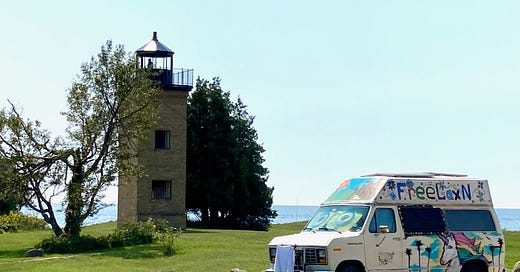A Different Way
From velvety tomato sauce to a legendary piano concerto to cryptocurrency, just about anything can be adapted for personal taste, lifestyle or livelihood.
A different way to travel. Bay de Noc Township, Michigan 2021
Let’s get started…
Tomato sauce! I’m not in the kitchen that often these days, but I’m inspired after reading about this super simple, but simply fantastic tomato sauce. Going to try it soon. Found the link in the latest Dense Discovery, one of my favorite inbox items. Check it out!
Music history. Whether or not this Brahms concerto is “better” with Glenn Gould’s interpretation is debatable as you will hear in Leonard Bernstein’s notable speech. As we learn, change in the hands of a skilled artist—in this case a musician—can prompt debate, disdain, praise, awe, or a combination of all of these. Here’s what Bernstein told his audience back in 1962 when he was conducting the New York Philharmonic with a young Glenn Gould as the soloist:
“You are about to hear a rather, shall we say, unorthodox performance of the Brahms D-minor Concerto, a performance distinctly different from any I’ve ever heard, or even dreamt of for that matter, in its remarkably broad tempi and its frequent departures from Brahms’ dynamic indications. I cannot say I am in total agreement with Mr. Gould’s conception, and this raises the interesting question: ‘What am I doing conducting it?’ I’m conducting it because Mr. Gould is so valid and serious an artist that I must take seriously anything he conceives in good faith, and his conception is interesting enough so that I feel you should hear it too.”
For the record, I know very little—next to nothing really—about music, but I love reading about its elements, the artists who bring these elements to life, and smart people’s interpretations of the end result. So, when I found Absolutely on Music - Conversations with Seiji Ozawa by Haruki Murakami at the local thrift shop, I happily paid $2.95 for the pleasure of reading it. It was in this book where I discovered the above anecdote (and much, much more). Enjoy the fascinating conversations between two thoughtful and wise individuals.
Here’s the video of the infamous performance described above.
One a more serious note, crytocurrency
Here in the United States with easy access to banks and other financial institutions, we take for granted the ease with which we purchase items online, move money from one place to another, or, if needed, get our hands on a desperately needed large sum with little red tape. With this ease also comes fees; moving money the traditional way involves a middleman that wants its share of one’s “wealth.” As I’ve learned, the above activities, even if one is willing to pay an institution’s fees, is simply not always possible in many countries around the world.
This Wired magazine article offers an understandable (and short) overview of the world of cryptocurrency (beyond an investing opportunity by the super rich) and its importance in countries in which the government is corrupt, financial institutions are either collapsing or controlled by the corrupt government, and the legal tender for that country has become worthless. Enter crypto.
How we usually think of crytocurrencies…
In 2021, Bitcoin went mainstream. Wall Street set its eyes on the world of crypto, with hotshot investors like hedge funder Paul Tudor Jones leading the pack; The Economist went from calling the cryptocurrency “useless” in 2018 to arguing that it belongs in most portfolios; tech CEOs Jack Dorsey and Elon Musk gamely crossed swords about Bitcoin’s merits at a conference run by an asset management firm. Popular opinion lags a bit: Many people still believe cryptocurrency is a giant, global get-rich-quick scheme. Others simply dismiss the entire thing as a speculation-driven fad in the best case, a criminal enterprise in the worst. But amid the noise, the enthusiasm, and the hype, we might be losing the most important story: the way cryptocurrency is changing lives in the developing world.
Let’s think differently…
Popular perception in the developed world remains that crypto is at best the domain of meme-conversant Wolf of Wall Street-like figures and at worst of drug dealers. Regulators and policymakers seem to partially share that belief, as crackdowns and strict regulations are announced across the globe from China to Turkey to the US. And yet in the Global South more and more people are choosing to use a technology designed to help them keep their wealth safe from confiscation, tyranny, or arbitrary restrictions. Whatever you think of crypto, its role as a force for good in some parts of the world should not be ignored.
Take five minutes to read the whole article, which details examples of crytocurrency’s value in impoverished and/or developing countries.
Finding appreciation and awe lately in reading, listening to, and thinking about artists who have a unique vision, a way of expressing ideas, or speaking out in “slanted” way. While I sometimes get impatient with their art form, my brain is learning how to decipher new, differently structured inputs. One of these artists: Laurie Anderson.
From Language is a Virus
“I don't believe there's such a thing as TV
I mean - they just keep showing
The same pictures over and over
And when they talk they just make sounds
That more or less synch up
With their lips
That's what I think
Language
It's a virus…”
That’s all. No matter how you commemorate the end of 2021 and the start of 2022, stay healthy, be a positive force, think before you speak, and laugh more.



